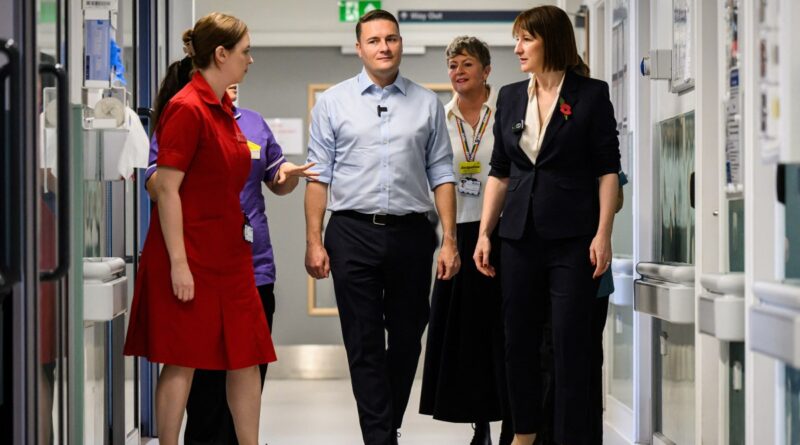Hospitals Tell Employees: We Can’t Meet Your Waiting List Commitment
Hospitals say they are unlikely to meet a key Labor promise on NHS waiting times, despite being given a £22.6 billion budget boost last month.
Most NHS trust bosses have said that financial pressures mean it is “unlikely” or “very unlikely” that they will return to treating patients on an 18-week basis in the next five years.
The NHS Providers Survey, from an annual survey of 171 trust leaders, was released ahead of a speech in which the health secretary will outline how the NHS must change instead and looking for more money.
Wes Streeting will outline measures to “catch up on wasteful spending” at a meeting of NHS Providers on Wednesday. This will include refusing to pay senior NHS leaders it rises if it does not improve performance.
He said: “I am committed to paying for the best and will defend the financial incentives to attract and retain talented people in the NHS. It is a great organization that has to compete with global businesses for of the best talent.
But there will be no more rewards for failure. We must clamp down on runaway spending and make sure that every penny that goes to the NHS helps patients – changes will not be popular but it is a matter of change or die. ”
He will also reduce corporate spending, proposing to ban trusts from using corporations to cover entry level gaps. Ministers are also considering banning NHS staff from resigning and immediately handing their services back to health services through recruitment agencies.
Last year the NHS spent £3 billion on agency staff.
The staff are selected with the commitment that at the end of their first term, the patients will not wait more than 18 weeks for examination, surgery or other procedures in the hospital. Currently almost half of patients on the hospital’s 7.6 million total waiting list are waiting longer than 18 weeks from being referred by a GP.
The Chancellor, Rachel Reeves, has given the NHS £22.6 billion to help create 40,000 extra people a week as a first step to reducing waiting times.
But there is widespread pessimism among NHS leaders that the money will help them see patients faster, as they say it will be swallowed up by rising wages and increasing demand.
There is also confusion among ministers about the NHS’s need for more money, with Alan Milburn, the government’s chief health adviser, telling The Times last week that the “culture of” more, and more” must end.
A survey of NHS Providers found that 71 per cent of trust leaders thought it was unlikely that the NHS would be able to meet the 18-week standard, as set out in the NHS Constitution. Only 14 percent believe it is possible or likely that this will be achieved within five years.
The figures were even worse among the leaders of specialist acute hospitals, who all said there was no chance of the NHS meeting the 18-week target.
Starmer said last month that the non-urgent care target was “the best benchmark for the NHS getting back on its feet”. The target, which calls for 92% of patients to start treatment within 18 weeks, was finally reached in February 2016.
The boss of one NHS trust said it was “the most difficult situation of all” and could not be met without change to prevent illness by investing in public services. and doctors.
They said: “There are seven million people on the waiting list, and as fast as you can get them off, right now, we’re putting more people on.” So it’s a big math game that’s going to cost a lot of money, unless you do something to stop the increase in people going on the waiting list. ”
Saffron Cordery, deputy chief executive of NHS Providers, said: “There will be progress, but can leaders trust, hands down, they’re going to reach those 18-week levels? I think that it is difficult and difficult to predict.
“We are in the earliest possible days of the new administration. I think [the Labour government] they have put in a small payment to make important improvements, but this problem is too big. ”
He added that most of the $22.6 billion announced in the budget would have to cover existing commitments, including a significant pay increase for junior doctors and nurses that would “eat up in it a lot”.
• Entrepreneurs trying to save the NHS with technology
Cordery said the rise in national insurance contributions in the budget also meant doctors, hospices and care homes would have to tighten their spending, meaning “those working with the NHS and delivering services to and for the NHS will be greatly affected”.
The survey found that 96 per cent of trust leaders are worried about their ability to cope this winter, fearing that flu and Covid will put a huge strain on hospitals. Ambulance and hospital leaders also raised concerns about the impact of continued industrial action by doctors, which could drive more patients to A&E.
Meanwhile, the Institute for Fiscal Studies, a think tank, said that NHS performance “remains worse” than it was before the Covid-19 pandemic, although “ts The hospital’s operations have increased significantly over the past year”.
#Hospitals #Employees #Meet #Waiting #List #Commitment
